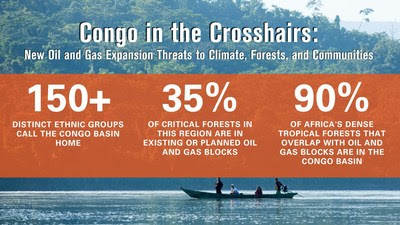SHARM EL-SHEIKH, Egypt, Nov. 14, 2022 /PRNewswire/ — As global leaders gather for ‘Energy Day’ at COP27 on Tuesday November 15, a new report highlights how fossil fuel expansion threatens Africa’s climate-critical tropical forests and casts doubt over how this will serve the region’s energy needs. Congo in the Crosshairs, a new analysis of oil and gas blocks in Africa and the Congo Basin clearly shows the growing threats posed by oil and gas development to critical ecosystems in Africa. Findings show:

- The area of land allocated to oil and gas production on the African continent may quadruple.
- Oil and gas exploration blocks overlap with 30% of dense tropical forests in Africa, of which 90% are in the Congo Basin.
- In the Congo Basin, 64 million hectares (an area nearly twice the size of Germany), now overlap with oil and gas blocks.
- Over 150 distinct ethnic groups call the Congo Basin home and over 35 million people, or 20% of populated places in the region are now in oil and gas blocks.
Whilst it is clear that no new fossil fuel development can take place anywhere if the world is to avoid surpassing internationally agreed climate goals, there are also few details about how this plan will address the energy needs of a continent that contains 90 percent of the world’s people lacking electricity.
Joe Eisen, Executive Director of the Rainforest Foundation UK, said, “The risk is that this push for oil in Africa’s forests will benefit foreign companies, export markets and politicians over rural communities. The time it will take to build the infrastructure necessary to extract oil from these remote and sensitive areas could also leave them as stranded assets as the world transitions to renewables. Africa has abundant potential in this area but currently only receives 2% of global investment. This needs to change.”
Solutions presented in the report focus on pushing G20 economies to accept their historical responsibility for climate change by committing to debt forgiveness and expanding financial resources that will enable the conditions for keeping fossil fuels in the ground and trees standing as well as promoting the rights of Indigenous Peoples and other local communities.
Report Links: English / French
Map Infographics Available for Use Linked Here
Images Available for Use Here
Francois BILOKO, General Secretary of Réseau CREF, a leading environmental network in the Congo Basin, offered a reality check at COP27:
“We must not let a chaotic expansion of fossil fuels risk our precious tropical forests, biodiversity hotspots, and the rights and livelihoods of forest communities who are already feeling the impacts of climate change. With a focus on realizing our potential in renewable energies, Africa and Congo Basin countries can lead the way to a prosperous green future,” he said .
“What the world needs now are 21st century solutions that put people, nature, and climate stability first. Critical ecosystems like the Congo and Amazon Basins and other regions must be prioritized for preservation along with the expansion of rights and territories for indigenous and local communities,” said Tyson Miller, Executive Director of Earth InSight
More can be found at: Earth Insight Web Portal (w usable maps, etc.) or Rainforest Foundation UK Site
Info – https://mma.prnewswire.com/
